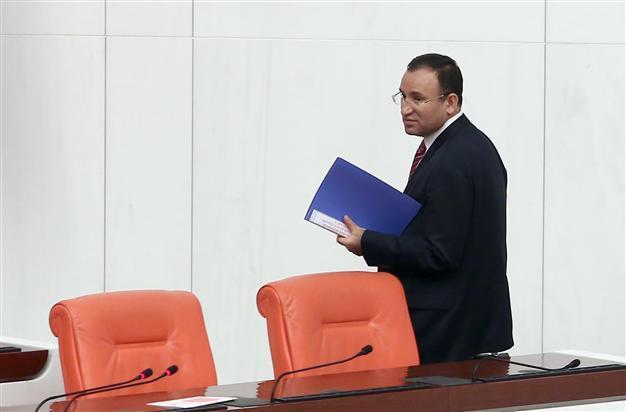Turkey abolishes special courts as part of new democratization move
ANKARA

The measures announced by Bekir Bozdağ were included in the proposal of the head of the Union of Turkish Bar Associations (TBB) seeking the retrial of coup plot cases. DHA photo
The Justice and Development Party (AKP) government is working on the content of a fourth democratization package that will abolish the infamous specially authorized courts (ÖYM) and other special courts authorized by anti-terror laws.
With plans to pass the democratization package before Parliament’s recess on the eve of the March 30 local polls, the government is planning to finalize the drafted bill as soon as Prime Minister Recep Tayyip Erdoğan returns from Iran.
“We will take a historic step that we should have taken a long time ago as a requirement of the rule of law,” Justice Minister Bekir Bozdağ told reporters Jan. 29. The measure would abolish ÖYMs and the courts authorized by Article 10 of the Anti-Terror Law, he added.
Bozdağ’s explanation followed a statement from Erdoğan late Jan. 27 in which he expressed his government’s firmness in scrapping ÖYMs.
“We have surely decided to abolish specially authorized courts. Likewise, abolishing the anti-terror law by transferring some of its articles to the Penal Code is in our aims,” Erdoğan told reporters late Jan. 27 before departing to Iran. With the abolishment of eight special courts, Erdoğan said 133 existing heavy penal courts would be the sole judicial bodies to deal serious crimes cases.
Special courts had been discontinued by Parliament in 2012, but a provisionary article allowed courts to finalize pending coup plot cases such as Ergenekon, “Balyoz” (Sledgehammer), Odatv and Poyrazköy.
Bozdağ, however, said that although the special courts would be abolished, completed cases would not be affected at all.
Abolishing the provisionary article and the anti-terror courts was included in a proposal by the head of the Union of Turkish Bar Associations (TBB), Metin Feyzioğlu, to retry coup plot cases. The measure is also expected to “clear the way” for an internal restructuring of the judiciary.
Steps against profilingThe package will also bring new measures in further protection of private life, Bozdağ said. “Our laws prohibit profiling. In the upcoming period, we will take important steps on issues of violations of individuals’ private lives and reputations,” he said.
It will also allow suspects and their lawyers to see their dossiers in the investigation phase in a move to strengthen their right to defense, Bozdağ said, adding that exceptional cases would be removed from Turkish legal system.
Asked about the government’s plan to abolish the courts, Parliamentary Speaker Cemil Çiçek said he would comment after seeing the whole draft but stressed that the main problem was not laws but implementation. “We have amended so many laws through the third judicial package. But we could only observe its implementation a year after its legislation, which wasted a whole year. That’s why I believe the main problem is the implementation of the laws,” he told reporters Jan. 29.
The main opposition Republican People’s Party (CHP), which had long pressed for the abolishment of the courts, welcomed the government’s move. In an initial statement, CHP leader Kemal Kılıçdaroğlu said he welcomed the move, according to daily Milliyet.
While the Peace and Democracy Party (BDP) also welcomed the move, the Nationalist Movement Party (MHP) expressed its objection to the abolishment of the ÖYMs.
“Who will benefit from a judiciary, which is under the control of Prime Minister Recep Tayyip Erdoğan?” deputy leader Oktay Vural asked at a press conference. “The special courts will be replaced by AKP courts.”
The government wants to present the amendment as if it was a “judicial reform,” but, actually it’s a “coup d’état,” Vural said.
